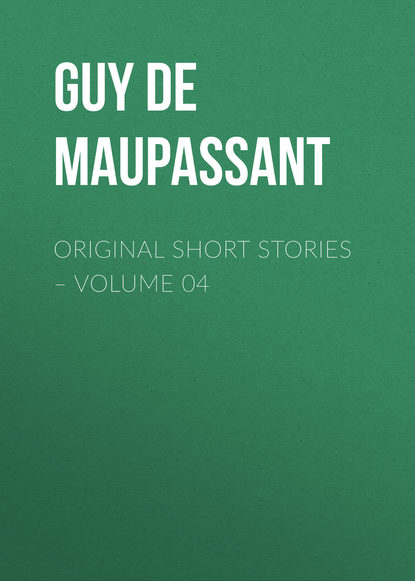По всем вопросам обращайтесь на: info@litportal.ru
(©) 2003-2024.
✖
Original Short Stories – Volume 04
Настройки чтения
Размер шрифта
Высота строк
Поля
“We dine at six o’clock, and you can amuse yourself until then. I cannot entertain you, as I have so many things to do.”
When he was alone he hesitated as to whether he should sleep or take a walk. He looked first at the door leading to his room and then at the hall door, and decided to go out. He sauntered slowly through the quiet Breton town, so sleepy, so calm, so dead, on the shores of its inland bay that is called “le Morbihan.” He looked at the little gray houses, the occasional pedestrians, the empty stores, and he murmured:
“Vannes is certainly not gay, not lively. It was a sad idea, my coming here.”
He reached the harbor, the desolate harbor, walked back along a lonely, deserted boulevard, and got home before five o’clock. Then he threw himself on his bed to sleep till dinner time. The maid woke him, knocking at the door.
“Dinner is ready, sir:”
He went downstairs. In the damp dining-room with the paper peeling from the walls near the floor, he saw a soup tureen on a round table without any table cloth, on which were also three melancholy soup-plates.
M. and Mme. Padoie entered the room at the same time as Varajou. They all sat down to table, and the husband and wife crossed themselves over the pit of their stomachs, after which Padoie helped the soup, a meat soup. It was the day for pot-roast.
After the soup, they had the beef, which was done to rags, melted, greasy, like pap. The officer ate slowly, with disgust, weariness and rage.
Mme. Padoie said to her husband:
“Are you going to the judge’s house this evening?”
“Yes, dear.”
“Do not stay late. You always get so tired when you go out. You are not made for society, with your poor health.”
She then talked about society in Vannes, of the excellent social circle in which the Padoies moved, thanks to their religious sentiments.
A puree of potatoes and a dish of pork were next served, in honor of the guest. Then some cheese, and that was all. No coffee.
When Varajou saw that he would have to spend the evening tete-a-tete with his sister, endure her reproaches, listen to her sermons, without even a glass of liqueur to help him to swallow these remonstrances, he felt that he could not stand the torture, and declared that he was obliged to go to the police station to have something attended to regarding his leave of absence. And he made his escape at seven o’clock.
He had scarcely reached the street before he gave himself a shake like a dog coming out of the water. He muttered:
“Heavens, heavens, heavens, what a galley slave’s life!”
And he set out to look for a cafe, the best in the town. He found it on a public square, behind two gas lamps. Inside the cafe, five or six men, semi-gentlemen, and not noisy, were drinking and chatting quietly, leaning their elbows on the small tables, while two billiard players walked round the green baize, where the balls were hitting each other as they rolled.
One heard them counting:
“Eighteen-nineteen. No luck. Oh, that’s a good stroke! Well played! Eleven. You should have played on the red. Twenty. Froze! Froze! Twelve. Ha! Wasn’t I right?”
Varajou ordered:
“A demi-tasse and a small decanter of brandy, the best.” Then he sat down and waited for it.
He was accustomed to spending his evenings off duty with his companions, amid noise and the smoke of pipes. This silence, this quiet, exasperated him. He began to drink; first the coffee, then the brandy, and asked for another decanter. He now wanted to laugh, to shout, to sing, to fight some one. He said to himself:
“Gee, I am half full. I must go and have a good time.”
And he thought he would go and look for some girls to amuse him. He called the waiter:
“Hey, waiter.”
“Yes, sir.”
“Tell me, where does one amuse oneself here?”
The man looked stupid, and replied:
“I do not know, sir. Here, I suppose!”
“How do you mean here? What do you call amusing oneself, yourself?”
“I do not know, sir, drinking good beer or good wine.”
“Ah, go away, dummy, how about the girls?”
“The girls, ah! ah!”
“Yes, the girls, where can one find any here?”
“Girls?”
“Why, yes, girls!”
The boy approached and lowering his voice, said: “You want to know where they live?”
“Why, yes, the devil!”
“You take the second street to the left and then the first to the right. It is number fifteen.”
“Thank you, old man. There is something for you.”
“Thank you, sir.”
And Varajou went out of the cafe, repeating, “Second to the left, first to the right, number 15.” But at the end of a few seconds he thought, “second to the left yes. But on leaving the cafe must I walk to the right or the left? Bah, it cannot be helped, we shall see.”
And he walked on, turned down the second street to the left, then the first to the right and looked for number 15. It was a nice looking house, and one could see behind the closed blinds that the windows were lighted up on the first floor. The hall door was left partly open, and a lamp was burning in the vestibule. The non-commissioned officer thought to himself:
“This looks all right.”
He went in and, as no one appeared, he called out:
“Hallo there, hallo!”
A little maid appeared and looked astonished at seeing a soldier. He said:
“Good-morning, my child. Are the ladies upstairs?”
“Yes, sir.”

















